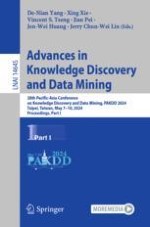2024 | OriginalPaper | Buchkapitel
Modeling Treatment Effect with Cross-Domain Data
verfasst von : Bin Han, Ya-Lin Zhang, Lu Yu, Biying Chen, Longfei Li, Jun Zhou
Erschienen in: Advances in Knowledge Discovery and Data Mining
Verlag: Springer Nature Singapore
Aktivieren Sie unsere intelligente Suche, um passende Fachinhalte oder Patente zu finden.
Wählen Sie Textabschnitte aus um mit Künstlicher Intelligenz passenden Patente zu finden. powered by
Markieren Sie Textabschnitte, um KI-gestützt weitere passende Inhalte zu finden. powered by
